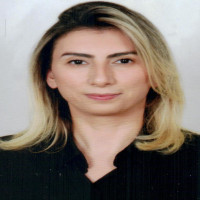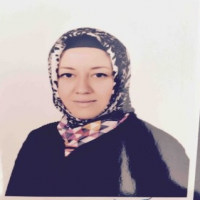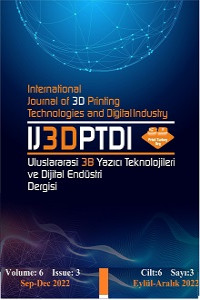Research Article
Review Articles
Issue Editorial Board


 0000-0001-8663-4466
0000-0001-8663-4466




 0000-0001-8052-9411
0000-0001-8052-9411





Aim & Scope
The objective of the journal is to contribute to the development of the profession of 3 dimensional technologies (additive manufacturing) and digital industry at national and international leves.
Medical Applications for 3D Printing (Bioprinting tissues and organs, Challenges in building 3d vascularized organs, Customized implants and prostheses, Low–cost prosthetic parts, Anatomical models for surgical preparation, Synthetic skin, Cranium replacement, Medical equipment, Bone, Tailor-made sensors, Personalized drug dosing, Unique dosage forms, Complex drug-release profiles)
Aplication Fields (Medical and dental applications, Dental practices and materials, Soft robotics systems, Robot gripper systems, Building applications, Die/mold applications, Architecture applications, Models applications, Rapid prototype applications, Visual arts applications, Textile applications, Digital factories, Architectural-model applications and materials, Industrial applications and materials, Food applications and materials, Artistic practices and materials, Scanning methods and modeling)
Digital Industry (Big data, Artificial intelligence, Digital life cycles, Sensors actuators, Augmented reality, visualization, System simulation, Wireless communication, ICT security, Digital business, Block chain, Data Safety, Autonomous robots, System integration, Internet of things (IT’s), Cyber security, Cloud computing,Digital factory)
3D Printer Design, Modelling and Analysis (3D printer design, extruder design, Product development, Ceramic systems design, Food systems design Table system design, Electronics components, Mechanic components, Standard components)
Mechanical Properties of Filaments (Polymer materials, Flexible materials, Bio materials, Metallic materials, Wood materials, Composite materials)
Program – Control Technologies (Control programs, Design programs, 3D scanning technologies, DMLS technologies, SLA technologies, SLS technologies, FDM technologies, Digital production technologies,
Other 3D printer technologies and digital industry
Author Guidelines
INTERNATIONAL JOURNAL OF 3D PRINTING TECHNOLOGIES AND DIGITAL INDUSTRY
PREPARATION
Authors are required to download the template file (Please click here to download the template)
Click for the copyright form. (Please click here to download the copyright form)
PlAGIARISM FILE: Full Text of manuscript including references section should be scanned with "iThenticate" or "Turnitin" programs. The Plagiarism result you will receive from the relevant program must be uploaded to the system in PDF format.
Ethical Principles and Publication Policy
ETHICAL PRINCIPLES AND PUBLICATION POLICY
GENERAL PRINCIPLES
The article acceptance processes and publication processes applied in the International Journal of 3D Printing Technologies and Digital Industry are the basis for the development and distribution of information in an impartial and respected manner. The processes implemented in this direction are directly reflected in the quality of the work of the authors and the institutions that support the authors. It is important that all stakeholders (authors, readers, researchers, publisher, reviewers and editors) comply with the standards for ethical principles. In the acceptance of the articles, the criteria of being original, likely to be cited and complying with academic principles are taken into consideration. No fee is charged from the authors during the article application and publication processes. Scientific, ethical and legal responsibilities of the articles to be published with DOI records belong to their authors.
If it is determined that the author(s) of the article used falsified and fabricated data, this situation is reported to the institution where the authors work, and the article is rejected.
The management of the International Journal of 3D Printing Technologies and Digital Industry (Pre-Inspection Board-Editorial Board and editor) switches to text reviews on plagiarism through ithenticate(R) and after other scientific audits. Articles with an upper limit of similarity rate of 20% (excluding References) and articles with a similarity rate exceeding 20% will not be evaluated.
The editorial group of the International Journal of 3D Printing Technologies and Digital Industry expects all its stakeholders to bear the specified ethical responsibilities and obligations within the scope of publication ethics. While establishing the ethical duties and responsibilities and obligations, the guidelines and policies published by the Committee on Publication Ethics (COPE) (https://publicationethics.org/resources/code-conduct) and Higher Education Institutions Scientific Research and Publication Ethics Directive, Interuniversity Board It has been prepared taking into account the Scientific Research and Publication Ethics Directive.
The Editorial Board of the journal handles all appeal and complaint cases within the scope of the COPE guidelines. In such cases, authors should contact the publishing office directly regarding their objections and complaints. When necessary, an ombudsman may be appointed to resolve cases that cannot be resolved internally. The Editor-in-Chief is the final authority in the decision-making process for all appeals and complaints.
In scientific studies containing the following issues, documents showing the permission of the ethics committee should be submitted to the journal and necessary information should be given in the article;
• All kinds of research studies carried out with quantitative or qualitative approaches such as interview techniques, experiment, focus group work, questionnaire, observation and interview, where data is collected from the participants.
• The use of humans and animals, including materials and data, for experimental or other scientific purposes
• Clinical studies in humans
• Studies involving animal experiments
• Retrospective studies in accordance with the personal data protection law.
In addition to these, information regarding the signing of the informed consent/consent document in case reports should be included in the article. For the use of content such as photographs, scales and surveys that do not belong to the authors of the article, the permission of the owners of these content should be obtained and stated in the article. In case of use of intellectual and artistic works, complying with the copyright regulations is obligatory.
ETHICAL DUTIES, RESPONSIBILITIES AND OBLIGATIONS
For Authors;
The author or authors who submit an article to the International Journal of 3D Printing Technologies and Digital Industry are expected to comply with the ethical responsibilities and obligations stated:
• The work of the author or authors is to be original and in the case of the author or authors benefit from other works or use other works, to cite and/or quote completely and accurately is required,
• Situations and relationships that may constitute a conflict of interest, if any, of all studies submitted for publication should be disclosed. Examples of potential conflicts of interest include employment, consultancies, stock ownership, honors, paid expert testimony, patent applications/registrations, and grants or other funding. Potential conflicts of interest should be reported at the earliest possible stage.
• Raw data about their articles can be requested from the author or authors within the framework of the evaluation processes, in such a case the author or authors should be ready to present the expected data and information to the editorial board and scientific committee.
• The author or authors must have a document showing that they have the rights to use the data used, the necessary permissions for research/analysis, or that they have performed the permission procedures for the experimental subjects.
• In the event that the author or authors discover an error or inaccuracy in their published, early appearance or evaluation stage, they are obliged to cooperate with the editor in informing, correcting or withdrawing the journal editor or publisher.
• The author or authors cannot have their work in the application process of more than one journal at the same time. Each application can be started following the completion of the previous application. The work published in another journal cannot be sent to the International Journal of 3D Printing Technologies and Digital Industry.
• Changing the author responsibilities of a work whose evaluation process has begun (such as adding an author, changing the order of authors, removing an author) cannot be offered.
All funding sources for research reported in the article should be detailed in the Acknowledgments section at the end of the article before references.
In addition to being responsible for parts of his work, an author should be able to identify which co-authors are responsible for certain other parts of the work. In addition, authors must rely on the accuracy of their co-authors' contributions.
If an article is written by more than one person, one of the co-authors should be selected as the lead author to conduct all correspondence regarding the article. Before the article is submitted, all authors must accept the order of the authors and provide their current membership and contact information. The corresponding author is responsible for ensuring the accuracy of this information.
The International Journal of 3D Printing Technologies and Digital Industry Journal provides a signed and scanned version of the authorship contribution form of the relevant authors (https://dergipark.org.tr/tr/) in the first submission process in order to act in accordance with authorship rights and to prevent ghost or honorary authorship. pub/ij3dptdi/page/9788). If the editorial board suspects a case of "gift writing", the application will be rejected without further investigation. Within the scope of the article submission, the corresponding author should also send a short statement stating that he accepts all responsibility for authorship during the submission and review stages of the article.
For Editors and Field Editors;
The editor and field editors are responsible for every publication published in the International Journal of 3D Printing Technologies and Digital Industry. Editor and field editors of the International Journal of 3D Printing Technologies and Digital Industry, "COPE Code of Conduct and Best Practice Guidelines for Journal Editors" and "COPE Best Practice Guidelines for Journal" published by the Committee on Publication Ethics (COPE) as open access. Editors should possess the ethical duties, responsibilities and obligations specified on the basis of the guidelines.
The editor-in-chief and section editors of the journal are responsible for deciding which of the articles submitted to the journal should be published. In this process, authors are not distinguished by their race, ethnicity, gender, religion or citizenship by the editors.
Editors are expected to;
• make an effort to meet the information needs of readers and authors,
• ensure the continuous development of the journal,
• carry out processes to improve the quality of the studies published in the journal,
• support freedom of thought,
• ensure academic integrity,
• conduct the processes without compromising intellectual property rights and ethical standards,
• show openness and transparency in terms of publication on issues that require correction and explanation,
• be responsible for publishing every article published in the journal in accordance with journal publication policies and international standards,
• be responsible for ensuring the protection of personal data regarding subjects or images included in the evaluated studies. It is responsible for refusing to work unless the explicit consent of the individuals used in the studies is documented. In addition, editors; The author is responsible for protecting the individual data of the reviewers and readers.
• prevent non-scientific articles that do not comply with academic etiquette.
• communicate effectively with everyone involved in the broadcasting processes and organizes meetings at regular intervals.
• take precautions against abuses and share their findings by conducting an objective investigation when there are complaints about misconduct.
The duties, responsibilities and obligations of the editor and field editors to the authors are as stated;
• Editors and field editors should make a positive or negative decision based on the importance, original value, validity, clarity of the narrative, and the journal's goals and objectives.
• Studies that are suitable for the scope of publication should be included in the preliminary evaluation stage unless they have serious problems.
• The editor and field editors should not ignore positive reviewer suggestions unless there is a serious problem with the study.
• New editors and field editors should not change the decisions made by the previous editor or editors, unless there is a serious problem.
• The "Blind Reviewing and Evaluation Process" must be published and the editors must avoid the problems that may occur in the defined processes.
• The editor and field editors should publish an "Author's Guide" that includes every subject expected from them by the authors in detail. These guides should be updated periodically.
• Authors should be informed and returned in an explanatory and informative way.
• Protects the intellectual property rights of the published articles, defends the rights of the journal and authors in case of violation. It checks that the contents of the articles published in the journal do not violate the intellectual property rights of other publications.
• Evaluates the criticisms of the published articles, ensures that the authors use the right of reply.
• In case studies contain negative results, they should also be taken into account and not ignored.
The duties, responsibilities and obligations of the editor and field editors towards the reviewers are as follows;
• The reviewers should be determined in accordance with the subject of the study.
• The editor and field editors are responsible for providing the information and guides that the reviewers will need during the evaluation phase.
• The editor and field editors have to consider whether there is a conflict of interest between the authors and the reviewers.
• In the context of blind reviewing, the identity of the reviewers should be kept confidential.
• The editor and field editors should encourage reviewers to evaluate the work in an impartial, scientific and objective language.
• The editor and field editors should evaluate the reviewers with criteria such as timely return and performance.
• The editor and field editors should determine practices and policies that increase the performance of reviewers.
• The editor and field editors should take the necessary steps to continuously and dynamically update the reviewer pool.
• The editor and field editors should prevent rude and unscientific evaluations.
• The editor and field editors take steps to ensure that the reviewer pool is broad.
Ethical Rules Regarding Reviewers
Reviewer;
• should avoid both constructive comments (based on courtesy) and derogatory comments in the process of evaluation of the article,
• should perform an objective evaluation and should not go beyond the scope of the study. Although closed review, namely blind arbitration, is carried out, matters such as religion, language, race, political views and commercial concerns should not be allowed to affect the evaluation.
• should complete the process on the basis of impartiality and confidentiality.
• should not review the publication before the article goes to the review stage, in the event of reviewer realizes a possible conflict of interest, and inform the editor.
• after evaluating the article, the document related to the article should be destroyed.
• should refuse evaluation if the study falls outside of the her/his specialty,
• should respond positively or negatively to the evaluation invitation, and conclude the article for which they accepted the evaluation in a timely manner.
Responsibilities of the Editorial Board of the International Journal of 3D Printing Technologies and Digital Industry
The Editorial Board,
• is responsible for all processes of manuscripts sent to the journal. This responsibility requires independent decision-making, taking into account the public interest, not personal interests. The relationship between the publisher and the Editorial Board is based on the policy of independence, and all decisions of the editors are independent of the publisher and other individuals and institutions,
• works to continuously improve and raise the quality of the journal,
• determines and implements journal policies as publication, blind reviewing, evaluation process and ethical principles,
• maintains the copyrights of the articles published in the International Journal of 3D Printing Technologies and Digital Industry are reserved,
• is responsible for the protection of the intellectual property rights of the authors during the publication processes and the protection against unethical behaviors, plagiarism and reference exploits,
• prepares the “Authors Guide” to inform the authors and the “Review Guide” to inform the reviewers about the evaluation processes.
• sets incentive policies for authors.
• preserves an electronic or written record of each article.
Price Policy
The journal doesn’t have Article Processing Charge (APC) or any submission charges.
International Journal of 3D Printing Technologies and Digital Industry is lisenced under Creative Commons Atıf-GayriTicari 4.0 Uluslararası Lisansı

